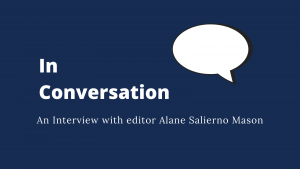An Interview with Alane Salierno Mason
by Jennifer Nguyen / March 1, 2021 / Comments Off on An Interview with Alane Salierno Mason

Alane Salierno Mason is Vice President and Executive Editor at W. W. Norton & Company, where she has edited prize-winning, bestselling nonfiction and fiction works. Along with her editorial role at Norton, she is the president and founder of Words Without Borders, a not-for-profit magazine that promotes international literature to English speaking audiences. Mason also has nonfiction essays in various publications and anthologies and is the translator of the New Directions Classic edition of Elio Vittorini’s Conversations in Sicily. As a writer, translator, editor, and the founder of one of our favorite homes for translation, Mason’s dynamic career leaves behind an expansive map of ever-urgent literature. Over winter break, between a few short moments of reprieve from her busy schedule, we were eager to learn a little more about her journey.
In your career, you’re always surrounded by literature, working as an executive editor at W.W. Norton, while also remaining involved with Words Without Borders and working on your own writing. What is your day-to-day life like, and how do you balance it?
This romantic concoction — “surrounded by literature” — makes me smile. I mainly work on nonfiction at W. W. Norton, so while it is intensive work with writing, the “surrounded by literature” part is like being surrounded by pastries in a bakery without ever having the time even to sample them. My Norton work is too consuming for me to spend any time at all on Words Without Borders on a daily, or even weekly, basis.
At Words Without Borders, I was intensely involved for several years in dreaming up the project, writing grant applications, and selecting works for the first three years of issues, but with the exception of making a rare recommendation, I have not been involved on an editorial level since. I also do not have time for my own writing. That is a very rare indulgence — lately, only as a way of mourning writer-friends who have died this past year. Other than that, two unpublished essays written over something like 15 years, and those, too, are acts of mourning.
What kinds of manuscripts are you working with now, and what kinds excite you?
I am working on a wonderful picaresque novel by bestselling Nigerian writer Uwem Akpan called New York, My Village, on a hilarious and pointed memoir by journalist and commentator Wajahat Ali called Go Back to Where You Came From, on a personal-political-philosophical narrative called Free by Albanian political philosopher Lea Ypi, on a potent collection of essays about anti-Semitism by Dara Horn, on internationally acclaimed philosopher Martha Nussbaum’s book about sexual abuse and harrassment, Citadels of Pride, on Rafia Zakaria’s Against White Feminism, on Jamaican-Floridian debut novelist Elias Rodrigues’s gorgeous debut, All the Water I’ve Seen Is Running, and so much more!
I am currently reading The Mountains Sing (2020) by Nguyễn Phan Quế Mai. Unlike past works, this is her first novel written in English, which has garnered immense American and international press that would have gone unnoticed had the novel been published in Vietnamese, her native language. I never heard of her strategy before — an author writing a work in their non-native language and instead in one with a much wider readership audience to get themselves internationally known. Have you heard of other strategies used by non-American writers to get themselves into the American publishing world that bypass working with organizations, such as Words Without Borders?
Russian author Nabokov, widely known for Lolita (1955), wrote in English after he moved to the US, if I’m not mistaken. I don’t think this move is so uncommon. Much more uncommon is the decision of an English-language writer, like Jhumpa Lahiri, to write in a second language, in her case, Italian.
Foreign writers who obtain positions teaching or lecturing regularly in the US are much more likely to have their work published here — they are “on site,” so to speak, for publicity, and much more likely to be able to speak colloquial English well enough to be interviewed, as well as to have a network of contacts through the institutions that have hosted them.
During your time at Words Without Borders has there been a particular work that greatly changed your worldview or that you still often think about?
I often think of the eloquent, imagistic work of Chinese writers Mu Xin (also a visual artist) and Yu Hua (author of The Chronicle of a Blood Merchant). Also, my view of the world was forever enlarged by our decision to launch Literature from ‘the Axis of Evil, which taught me a phenomenal amount about the rich fertility of the literary scene in Iran and the strong, cultural bridges between Iran and the US; about the relative isolation and often, life in exile, of a whole generation of Iraqi authors; about the cataclysm of the Iran-Iraq war for writers in both places, and about the frightening nature of the regime in North Korea, where writers were obligated to tack on propagandistic homages to the Great Leader in order to be published in state magazines, the only literary outlets. The work of Iranian and Iraqi women writers that the magazine has published more recently is stunning. I also loved, from the early days, a story about an Italian grandmother at a gay rights march; the whole genre of Arab stories making fun of mullahs; a story about an Argentine couple chasing a lobster around a kitchen.




